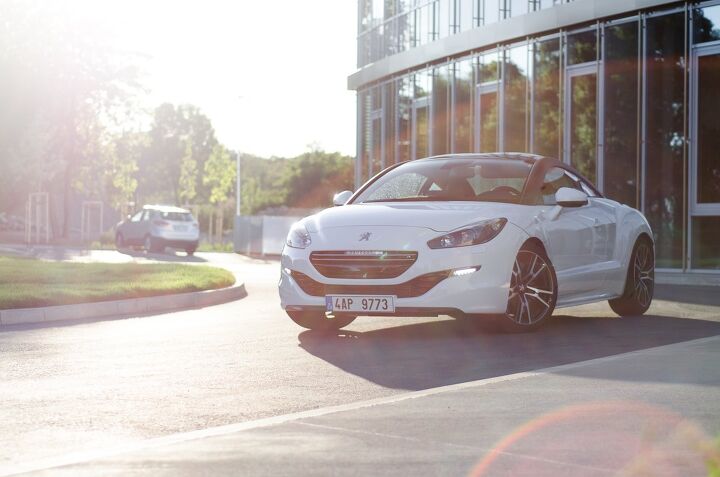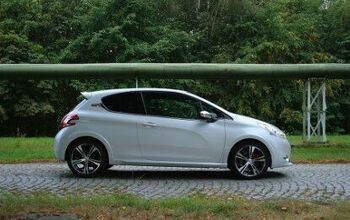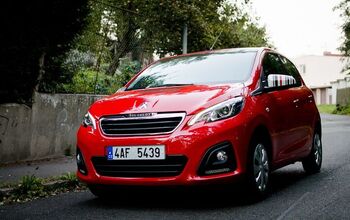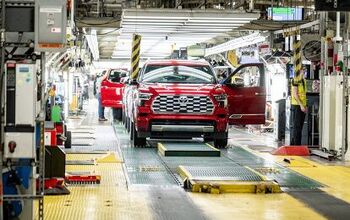European Review: Peugeot RCZ-R
As I exit the sleek, svelte coupe and to buy some ice cream, the car is crackling and popping like a campfire doused. I feel there’s something contradictory about this. After what I did for last hour or so — blasting around back roads at speeds far above socially acceptable levels, manhandling the tiller just to keep it straight under throttle, thundering through hairpin turns and using massive traction provided by a limited-slip diff — I should be doing something manly. Chomping on a fat steak and downing a beer; not licking a sweet cone filled with a frozen, sugared dessert. And the car behind me should be a butch, masculine coupe; not a curvy, chic little Peugeot.
It used to be that you could recognize a proper, hardcore sportscar just by looking at it. Defined within the text of The Sportscar Bible was, almost invariably, an exceptionally long hood to tell the world there was an equally massive engine below. Short front and large rear overhangs communicated a message of outrageous power fed aft of the passengers. And the bodywork itself was to be naturally angry, aggressive, and peppered with various scoops, vents and wings to keep cool its mechanical might.
With the RCZ-R coupe, Peugeot conjured its inner Peter Stormare, picked up that holy book of speed and machismo, and hurled it into a wood chipper.
Peugeot has always been more GTI than GT. The French company has never been in the business of making high-powered, muscular coupes. There’s no model in Peugeot’s history that can be leveraged as inspiration for a hardcore sports coupe, nor for capturing the ingrained nostalgia of those looking to sink money into ungranted pubescent wishes inspired by posters on bedroom walls. That meant starting from a clean sheet of paper to build the RCZ-R – something surprisingly uncommon in this business and contrary to the established lineages of the 911 and Mustang. Even the Toyobaru twins and Alfa 4C are based, more or less, on ancestral spirits.
Of course, that sheet of paper wasn’t bleached-white 20 pound stock. It never is with any modern car — and even less so for cash-strapped maker Peugeot. Therefore, the French marque went with gridded sheets provided by the last-generation Peugeot 308 (and the 307 before that), which dictated the front-engine/front-wheel-drive layout. It’s within those grids that designers and engineers found enough freedom to create the RCZ.
Four or five years ago, the original RCZ was the first car in a dog’s age to give me hope for Peugeot’s future. It put style above substance, yet handled surprisingly well: the steering was lovely, gear changes precise, and the engine — borrowed from a Mini Cooper S — was a marvel. Still, the RCZ was more of a gentleman’s GT than a raw sportscar, and I didn’t expect its R variant to be much different.
More power? Probably. Better traction? Maybe, courtesy of its limited-slip diff in the front. Fake engine noises? Almost certainly, as those have become a staple of fast Peugeots as of late. Needless to say, I didn’t expect an honest-to-goodness hardcore sportscar.
But I got one.
In today’s world of adaptive suspensions, artificial steering and electronically adjustable throttle response, the super Pug doesn’t even have a sports mode. Or maybe I should say it doesn’t have a normal one. It’s all out, all the time.
Floor the pedal and your tympanic membrane is battered by an engine’s wail that only gets louder when you open the window. The RCZ-R is not an adult actress with aftermarket bolt-ons deceptively vocalizing her pleasure for dramatic effect. Instead, it’s a refined turbocharged four when milling about with the neighbours and surprisingly hungry for jackhammering revs when not.
That’s not to say it isn’t temperamental; the RCZ-R has a mind of its own if you’re not driving atop surfaces smoother than, say, the lens of the Hubble Telescope. Torque steer allies with the wide tires’ tendency to tramline. Steering is a democratic process where you and road undulations get equal votes. It’s like playing with a docile lion: You know it doesn’t want to kill you, but you’re never completely sure.
The fat tires, limited-slip diff and rev-happy engine to power it all combine to make the RCZ-R a handful, but it’s those same traits that deliver an exhilarating driving experience when pushed hard. The limited-slip diff and fat tires that make the car difficult to keep on a straight line also conspire to provide enough traction to put down 270 horsepower through the front wheels — no easy feat. That same mechanical team is able to utilize every last horsepower and pound-foot of torque without uttering even so much as a single tire screech in protest. Goofing around and wagging its tail isn’t the Peugeot’s forte. It excels at being stupid fast — road conditions permitting.
Find a great road, though, and you find Nirvana. As your feet dance on perfectly spaced pedals, you start to really appreciate the old-school feel of the RCZ-R’s controls. Blipping the throttle comes natural, as does rowing through its gears. The steering is slightly heavy and one of the last sports cars to have a proper hydraulic assist. It all feels a bit like a sports coupe from the 1990s — but with 270 horsepower.
The RCZ-R is certainly not a soft GT. It’s a true, uncompromising sportscar that requires a real driver behind the wheel. Quite ironically, in age when traction control can save your bacon if you’re a bit too lead-footed in a rear-wheel-drive car, no kind of electronic nanny will help you in the fight against tramlining and massive torque steer. You feel the RCZ-R’s limited-slip diff helping you power through the corners while at the same time knowing it has the potential to send you into a ditch if you cock it all up. In comparison, driving the the current Mustang GT is a calm and steady experience; an old man’s gran turismo.
Even the interior in the Mustang feels more modern and sophisticated in comparison. The RCZ-R is home to outdated displays and a buttonless steering wheel cribbed from the old 307. It all feels a bit cheap compared to the newest compact Pugs.
Which brings us to the last, and quite massive, problem with this car: price.
In most European markets, you will pay a bit over €42,000 ($45,000 USD) for the privilege of owning the French hooligan. That makes it more expensive than the aforementioned Mustang. You know, the proper Mustang, with the V-8 and GT badges. Or, alternatively, you can buy nearly two entire Miatas.
But maybe you love fast front-wheel-drive cars. Or maybe you just hate convention and want a sportscar designed from a nearly clean sheet of paper. It’s even possible that you’ll select the Peugeot because you consider the eight-cylinder muscle car to be too soft and timid. Either way, it’ll be a very bold decision. And, ultimately, an admirable one.
Vojta Dobes is motoring journalist from Czech Republic who previously worked for local editions of Autocar and TopGear magazines. Today, he runs his own website, www.Autickar.cz. After a failed adventure with importing classic American cars to Europe, he is utterly broke, so he drives an Alfa 164 Diesel he got for free. His previous cars included a 1988 Caprice in NYC Taxi livery, a hot-rodded Opel Diplomat, two Dodge Coronets, a Simca, a Fiat 600 and Austin Maestro. He has never owned a diesel, manual wagon.
Photography: David Marek
More by Vojta Dobe
Latest Car Reviews
Read moreLatest Product Reviews
Read moreRecent Comments
- Honda1 Unions were needed back in the early days, not needed know. There are plenty of rules and regulations and government agencies that keep companies in line. It's just a money grad and nothing more. Fain is a punk!
- 1995 SC If the necessary number of employees vote to unionize then yes, they should be unionized. That's how it works.
- Sobhuza Trooper That Dave Thomas fella sounds like the kind of twit who is oh-so-quick to tell us how easy and fun the bus is for any and all of your personal transportation needs. The time to get to and from the bus stop is never a concern. The time waiting for the bus is never a concern. The time waiting for a connection (if there is one) is never a concern. The weather is never a concern. Whatever you might be carrying or intend to purchase is never a concern. Nope, Boo Cars! Yeah Buses! Buses rule!Needless to say, these twits don't actual take the damn bus.
- MaintenanceCosts Nobody here seems to acknowledge that there are multiple use cases for cars.Some people spend all their time driving all over the country and need every mile and minute of time savings. ICE cars are better for them right now.Some people only drive locally and fly when they travel. For them, there's probably a range number that works, and they don't really need more. For the uses for which we use our EV, that would be around 150 miles. The other thing about a low range requirement is it can make 120V charging viable. If you don't drive more than an average of about 40 miles/day, you can probably get enough electrons through a wall outlet. We spent over two years charging our Bolt only through 120V, while our house was getting rebuilt, and never had an issue.Those are extremes. There are all sorts of use cases in between, which probably represent the majority of drivers. For some users, what's needed is more range. But I think for most users, what's needed is better charging. Retrofit apartment garages like Tim's with 240V outlets at every spot. Install more L3 chargers in supermarket parking lots and alongside gas stations. Make chargers that work like Tesla Superchargers as ubiquitous as gas stations, and EV charging will not be an issue for most users.
- MaintenanceCosts I don't have an opinion on whether any one plant unionizing is the right answer, but the employees sure need to have the right to organize. Unions or the credible threat of unionization are the only thing, history has proven, that can keep employers honest. Without it, we've seen over and over, the employers have complete power over the workers and feel free to exploit the workers however they see fit. (And don't tell me "oh, the workers can just leave" - in an oligopolistic industry, working conditions quickly converge, and there's not another employer right around the corner.)











































































Comments
Join the conversation
Good write up, too bad Peugeot is being reported as having no successor to the RCZ.
Does PEUGEOT actually light up on the front? If so, that's fantastic.